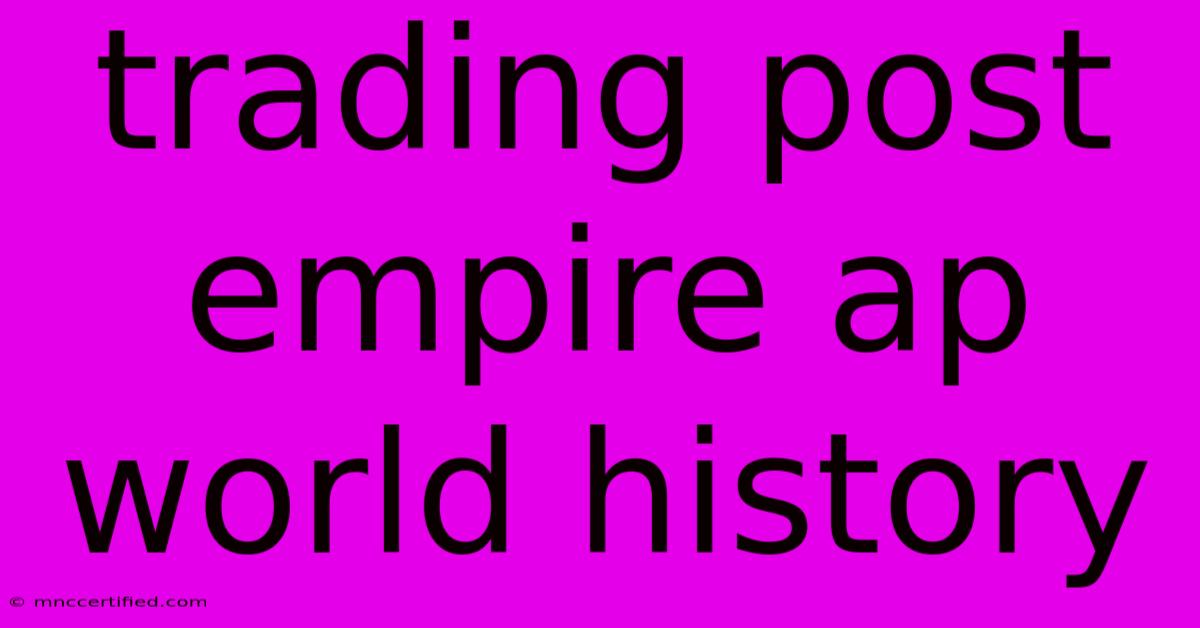Trading Post Empire Ap World History

Table of Contents
The Trading Post Empire: A Key to Understanding the Early Modern World
The rise of trading post empires in the Early Modern period (1500-1800) dramatically reshaped the global landscape. These empires, characterized by their reliance on strategic trading posts rather than extensive territorial control, played a crucial role in facilitating the exchange of goods, ideas, and people across continents. Understanding these empires is vital to grasping the complexities of this era, as their impact continues to resonate in our world today.
Defining the Trading Post Empire
A trading post empire, unlike traditional empires, aimed for control of specific trade routes and valuable commodities rather than conquering vast swathes of land. These empires established strategic outposts at key locations along trade routes, often near harbors or riverbanks. These posts served as centers for collecting, processing, and distributing goods, facilitating trade between different regions and cultures.
Key characteristics of trading post empires included:
- Limited Territorial Control: They primarily focused on controlling trade routes and valuable resources rather than conquering vast territories.
- Strategic Outposts: They established trading posts at vital locations to secure trade flow and collect goods.
- Commercial Focus: Their primary goal was to control and profit from trade, driving economic growth and expansion.
- Indirect Rule: They often used local rulers and intermediaries to maintain control, minimizing direct administration and military expenditure.
Examples of Trading Post Empires
Several prominent trading post empires emerged during the Early Modern period:
- The Portuguese: From the 15th century onwards, Portugal established trading posts along the coast of Africa, in India, and in the East Indies, controlling the spice trade and establishing a global network of commercial outposts.
- The Dutch: Following in the Portuguese footsteps, the Dutch East India Company (VOC) emerged as a formidable power, controlling crucial trade routes in Southeast Asia, particularly in the spice trade.
- The British: The British East India Company, fueled by the desire for tea and other Asian commodities, established a vast network of trading posts throughout India, ultimately leading to political dominance in the region.
The Impact of Trading Post Empires
These empires left a lasting impact on the world, shaping the course of history in numerous ways:
- Globalization of Trade: They facilitated the exchange of goods, commodities, and raw materials across continents, leading to a burgeoning global economy.
- Cultural Diffusion: The movement of people and ideas through trading posts resulted in a significant exchange of knowledge, practices, and beliefs across cultures.
- Colonialism and Imperialism: The rise of trading post empires paved the way for European colonialism and imperialism, as control over trade routes often led to political dominance.
- Economic Transformation: The wealth generated by trading post empires fueled economic growth in Europe, leading to technological advancements and social changes.
Studying Trading Post Empires
Understanding the rise and impact of trading post empires requires delving into various aspects of history:
- Trade Routes: Examine the key trade routes and their significance in the global economy.
- Commodities: Understand the valuable commodities that drove trade, such as spices, tea, and textiles.
- Political Strategies: Analyze the methods used by trading post empires to establish and maintain control over trade routes.
- Social Consequences: Explore the impact of trading post empires on local populations and cultures.
By studying these empires, we gain insights into the forces that shaped the Early Modern world and their continued influence on the global landscape today.
Conclusion
Trading post empires were crucial actors in the Early Modern world, facilitating global trade and shaping the course of history. Understanding their strategies, their impact, and their legacy is crucial for comprehending the interconnectedness of the world and the long-lasting consequences of economic dominance and globalization.

Thank you for visiting our website wich cover about Trading Post Empire Ap World History. We hope the information provided has been useful to you. Feel free to contact us if you have any questions or need further assistance. See you next time and dont miss to bookmark.
Featured Posts
-
How Much Does Bonding On Teeth Cost
Nov 12, 2024
-
Gary Lineker Out As Match Of The Day Host
Nov 12, 2024
-
Club Statement Transparency And Updates
Nov 12, 2024
-
Bonded Collectors Portage Wisconsin
Nov 12, 2024
-
Yellowstones Costner Exit Fans React With Fury
Nov 12, 2024